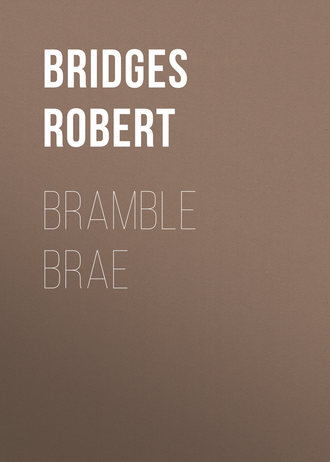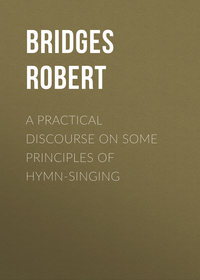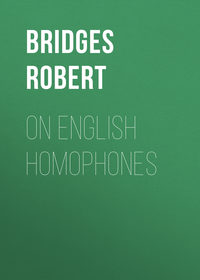 полная версия
полная версияBramble Brae
WITH FLOWERS
ON A SPRAY OF HEATHER
Far from its native moorlandOr crest of “wine-red” hill,At sight or scent of heatherThe hearts of Scotsmen thrill.Though crushed its purple blossoms,Its tender stems turned brown,It brings romantic HighlandsInto prosaic town.The clans are on the border,The chiefs are in the fray;We’re keen upon their footstepsWith Walter Scott to-day.Peat smoke from lowland cottageFloats curling up, and turnsOur dreams toward quiet hearthstonesAnd melodies of Burns.And last our fancy lingersWith fond regret and vainWhere sleeps our TusitalaBeneath the tropic rain—Far from the purple heatherOr gleaming rowan bough,Alone on mountain summit,“Our hearts remember how.”St. Andrew’s DayTHE HOTHOUSE VIOLET SPEAKS
TO A FAIR WOMANI’ve calmly lived my sunny little lifeUnder the crinkling glass, and free from strife;The sky above and all around is blue,And from this haven now I come to you.Fair Lady, tell me have I heard arightThat other flowers do not live so bright?That in dark forests and by noisy streamsThe pale wood violet sheds its purple beams?While we are merry in this fireside glowMy humble cousin shivers in the snow;And yet a cricket whispered once to meThat I the captive was—my cousin, free!Sometimes I’ve dreamed the cricket told me true;I’ve longed for freedom and the pleasing viewOf moss-grown hummocks and great whispering trees,With gold-winged songsters humming in the breeze.The dream is over—I have lived my dayNourished in sun with other violets gay;And now I’m borne afar to Paradise,To find my haven in your gentle eyes.If I may touch your lips I’ll die contentWithout one glimpse of freedom or days spentIn woodland dells; oh, murmur, while I fade,Your own sweet mem’ries of the forest glade!Come, tell me quickly, for my brief hours pass;What! You too captive in a house of glass?A SONG
WITH A RED ROSE ON HER BIRTHDAYWhat the Rose thought:Oh, to be one-and-twenty!But I am a rose that must bloom for a day;My life is like color and perfume in May;To-night I shall fade in her beautiful hair,And touch with my petals her proud neck and fair.Oh, to be one-and-twenty!What She sang, exultingly:Oh, to be one-and-twenty!To feel that the glorious days of my youthAre only the promise of hope, love, and truth—That all joyful things in my bright future gleam,And I am to live them and find out my dream.Oh, to be one-and-twenty!What He wrote, sadly:Oh, to be one-and-twenty!To dream that the great world is still all my own,And cherish again the ideals that have flown;To follow them, hiding with cunning and art,And find them all sleeping within her warm heart,Her heart that is one-and-twenty!WHAT THE FLOWERS SAID
Here are roses, red and white,Each to speak what I would write;For, when in your quiet roomYou may smell their sweet perfume,I shall whisper through these flowersFancy’s thoughts for evening hours.Then, when in the crowded streetYou and I may chance to meet,I’ll discover in your eyesWhat you’ve half expressed in sighs;For if in your dusky hairOne red rose you deign to wearI shall say, “I know that sheWears it for her love of me.”But if on your gentle breastOne white rose may dare to rest,Then in rapture I’ll declare,“That’s my heart a-resting there.”But if neither red nor whiteMay your hair or gown bedight,Still with confidence I’ll say,“That is lovely woman’s way—What of life is largest partHides she deepest in her heart!”DIANA’S VALENTINE
WITH A BUNCH OF VIOLETSGood Saint Valentine, I pray,While around this town you stray,You will keep your eyes alertFor a maid who loves to flirt.If among the hurrying crowd—Beauties fair and beauties proud—You should see one like a queen,Eyes of blue, with golden sheenIn her hair that’s flecked with brown,And a grace about her gown,That’s Diana!Catch her eyeAs she’s gayly tripping by;Say you know a sorry wight,Slow of speech and slow to write,Who would tell her through these flowersThat her eyes are bright as starsIn the blue; that her speechHaunts his mem’ry (out of reachLike their perfume faint but fine);That her laugh is like rare wine.As you leave her touch her lips;Say that men are like old ships,Easy towed, but hard to steer;Then just whisper in her ear,“Lovers change, but friends are trueLike these violets.” Then, “Adieu.”This, Saint Valentine, I pray,On the morning of that dayWhen you keep your eyes alertFor all maids who love to flirt.Arcady, February fourteenthWITH SOME BIRTHDAY ROSES
If I were not a speechless flowerI’d like to talk with you an hourAnd whisper many pretty thingsThat thinking of your birthday brings.(For flowers can dream of happinessWhile you their velvet petals press!)But I can’t talk—I know a manWho often vainly thinks he can,And what he wanted me to doWas simply to look fair to youAnd wish you joy—and then surpriseThe gentle look in your dear eyes.WRITTEN IN BOOKS
IN A VOLUME OF HERRICK
Dear old worldling gone astray,You would rather sing than pray;While you wore the preacher’s gownHow you longed for London Town!When your head ached, then, alack!You, repentant, gave up sack;Old and worn you ruthlesslyBade farewell to poesy;Full, you never cared for food,Sated, you were always good.Julia’s beauties you rehearse,Sing her charms in wanton verse,But to make poor Julia thineNot one pleasure you’d resign.Flattering, you tried to please;Generous, you loved your ease!Dear old Herrick, you’re a ManBuilt upon the human plan;To the world your fame belongsFor the beauty of your songs—Glorious poet—not a saint—Lyric splendor without taint!IN “SHAKESPEARE’S SONNETS”
The Sonnets—bound by RivièreAnd newly illustrated!As though the words that Shakespeare wroteBy outward dress are rated!The soul—the fine, immortal partThat lives without the binding,Is something from the poet’s heart;’Tis here—and worth the finding.IN “SONNETS FROM THE PORTUGUESE”
In this book a woman wrote her heart—Etching there the image of a Man.Faithful woman! But the years depart,And love is dust, and life a broken span!IN GEORGE MEREDITH’S POEMS
Here is a forest tangle—Rank weeds, luxuriant ferns, and giant trees,All in a hoarse-voiced wrangle,With creaking branches swaying in the breeze.But if you care to listen,Above the noise you’ll hear the piping of a bird,Gay feathers in the tree-tops glisten,And over all the sweetest music ever heard.IN “THE KING’S LYRICS”
Behold “The Lyrics of the King”!As though a crown on those who singCould make their music sweeter!To-day we’ll choose the better part—The gentle music of the heartThat masters rhyme and metre.THE SONG OF TEMBINOKA, KING OF APEMAMA
TO ROBERT LOUIS STEVENSONSing, my warriors, sing! men of the sharklike race!Sing of the poet who came and greeted us face to face.He from the cold, gray North, I, in these tropic isles,Meet as brothers and bards, with eloquent songs and smiles—Meet as brothers, though singing words that are strange and proud.Pale and wan is his face, while mine is a thunder-cloud;But the heart of a man is hidden by neither language nor skin—To love as a man and a brother maketh the whole world kin.The tales that he tells are of heroes who fought like braves to the death—Bone of our bone are these heroes, the very breath of our breath!Then sing, my warriors, sing! men of the sharklike race!Sing of the poet who came and greeted us face to face!From Overheard in ArcadyIN THE MANNER OF KIPLING
“Show me the face of Truth,” the Sahib said—“Show me its beauty, before I’m dead!”“Look!” said the priest, “with unflinching eyes;This is the World, and not Paradise.Look! It is wicked, and cruel, and strong, and wise!”From Overheard in ArcadyFOR A NOVEL OF HALL CAINE’S
AFTER KIPLINGHe sits in a sea-green grotto with a bucket of lurid paint,And draws the Thing as it isn’t for the God of Things as they ain’t!IN “HELBECK OF BANNISDALE”
The foolish story of a man and maidWho loved each other but were dire afraidTo follow where their true hearts surely ledAnd, risking all things, bravely to be wed.What’s in a creed to keep two souls apart?The universal solvent is the heart!A CHRISTMAS GREETING
Good luck, good cheer, throughout the year!A bright fire on the hearthstone burning;A gleam of rose at evening’s closeWhen, wearied, you are homeward turning!By ingle-nook a soothing book—A few old friends in Mem’ry’s castle;A bit of rhyme at Christmas-timeTo wish you fortune at your wassail!IN NICHOLSON’S “ALMANAC OF SPORTS”
(WITH VERSES BY KIPLING)In all your Calendar of SportsWhy, Rudyard, do you slight the wheel?Were you, then, never out of sortsUntil you felt the vibrant steelSkim over miles of level track?For youth, with all its hope and cheer,When we’re a-wheel comes rolling back—And it is Summer all the year!IN NICHOLSON’S “CITY TYPES”
The City’s roar is rising from the street;The old, bedraggled “types” are shuffling through the strife;They plod and push, and elbow as they meet,And glare and grin, and sadly call it “life.”For us the fireside hearth is all aglow,And those we love make up the life we know.IN “THE GOLDEN TREASURY”
The year is old, the way is far;I catch your image like a starThat’s mirrored in a crystal brook;For love of you I send a book!A VALENTINE
Though all the streams are white with frostAnd all the fields with snow,Though earth its greenery has lost,And biting gales do blow—Still I’ll recall the summer hours,The blue skies and the vine—The hillsides pink with Alpine flowersTo greet my Valentine!IN “HALLO, MY FANCY!”
(BY CHARLES HENRY LÜDERS AND S. D. S., JR.)“Hallo, my Fancy! View Hallo!”The nimble game has broken coverAnd skims the valley to and fro;By cooling brooks it seems to hover,Then bounds along. “Ho, View Hallo!”The huntsmen cry from brake to loch;The chase grows ardent—“View Hallo!”From quiet shelter echoes, Droch.THE BOOK SPEAKS
TO EUGENE FIELDI’m keeping jolly comp’nyIn a room that’s full of books;I’m cheek by jowl with HoraceAnd a lot of ancient crooks.But the boys I like to play with,When the boss takes off his coat,Are the wild and woolly heroesFrom Casey’s tabble-dote.And when the lamp is lightedAnd cosey hours ensue,I talk with All-AloneyAnd the little Boy in Blue.But when the man that owns the booksThrows one kind glance at meI sing just like the DinkeyIn the Amfelula Tree.IN HERFORD’S VERSES
To weep with those who weep is human;We give our praises to the man of grit,And honor with our trust the true man;Let’s laugh a little with a man of wit!IN A BOOK OF GIBSON’S DRAWINGS
You may turn these pages over,Looking for the priceless pearl;You may search from back to coverFor the finest Gibson girl.You can save yourself the trouble—It’s no earthly use to look:The charming girl who takes the medalIs a-holding of the book.IN A VOLUME OF MISS GUINEY’S POEMS
A maker of smooth verse and facile rhymes,And lover of quaint legends from old times;A joyous singer in New England bleak—Her heart is Irish and her mind is Greek.IN “BARBARA FRIETCHIE—A PLAY”
TO J. MWe met her first in Arcady,Where visions fair are apt to be,Roaming beneath the arching trees—Her laughter cheering up the breeze;Sometimes as gay as Colinette,Then fond and sad as Juliet.And when we’d had enough of anguishShe’d make us laugh as Lydia Languish.No mask or mood was twice the same—Yet one fair face behind each name.As that bright vixen of the mind,The fascinating Rosalīnd—As Imogen or Viola,Or, best of all, sweet Barbara—Always the same alluring graceAnd wit that sparkles in her face!The road to Arcady is farAnd sometimes lonely for a star—But all the phantoms of the airAnd poets’ dreams that wander thereWould miss the welcome we extend,Not to her Art—just to a friend!TO C. H. M. AND H. H. M
Here is the story—I haven’t half told it;The fun and the glory,A volume can’t hold it.But this is a spray,Withered leaves and pressed flowers,From a faded bouquetThat was plucked in gay hours,Within sound of the wavesOf the gentle Pacific,Where Nature enslavesAnd the days beatificAre sandalled with goldAnd wear gems on their fingers.All the tale is not toldWhich slow Fancy weaves,But a faint odor lingersAbout these dry leavesThat may bring recollectionOf prairie and lochWith a hint of affectionFromYours ever,Droch.Dedication of The Monterey WeddingTO MY MOTHER
Long years you’ve kept the door ajarTo greet me, coming from afar;Long years in my accustomed placeI’ve read my welcome in your face,And felt the sunlight of your loveDrive back the years and gently moveThe telltale shadow ’round to youth.You’ve found the very spring, in truth,That baffles time—the kindling joyThat keeps me in your heart a boy.And now I send an unknown guestTo bide with you and snugly restBeside the old home’s ingle-nook.—For love of me you’ll love my book.Dedication of Overheard in ArcadyA BOOK’S SOLILOQUY
My lady’s room is full of booksAnd easy-chairs and curtained nooks,And dainty tea-things on a table,And poetry, and tale, and fable,And on the hearth a crackling fireThat welcome gives, and when you tireOf pleasant talk you still may findA tempting pasture where the mindMay browse awhile, and read the pagesWhich poets wrote, or fools, or sages.And here I come to ask a placeAmong these worthies, face to face!To be allowed on some low shelfTo rest and dream, and pride myselfOn being in such company—To watch fair women drinking tea;And if, perchance, on some lone day,The gentle mistress looks my wayAnd softly says, “Now I shall seeWhat’s going on in Arcady!”Then I’ll rejoice that I’m a bookAt which my lady deigns to look.ENVOY
THE SHEPHERD TO HIS FLOCKThe sun is warm upon the ridges now;The way was rough and steep;I’ll seek the shelter of a leafy boughAnd watch my grazing sheep.The smoke is rising from the valley there,The hum of wheels and trade;The stress of life is in the whirling airWhile I pipe in the shade.Where work is fierce amid the striving throngAnd music’s voice is mute,Some one may catch the echo of a song—The faint note of a lute.1
Tall, silent old Woody, a fine type of the fast-vanishing race of game-hunters and Indian-fighters.
Roosevelt’s The Wilderness Hunter.



